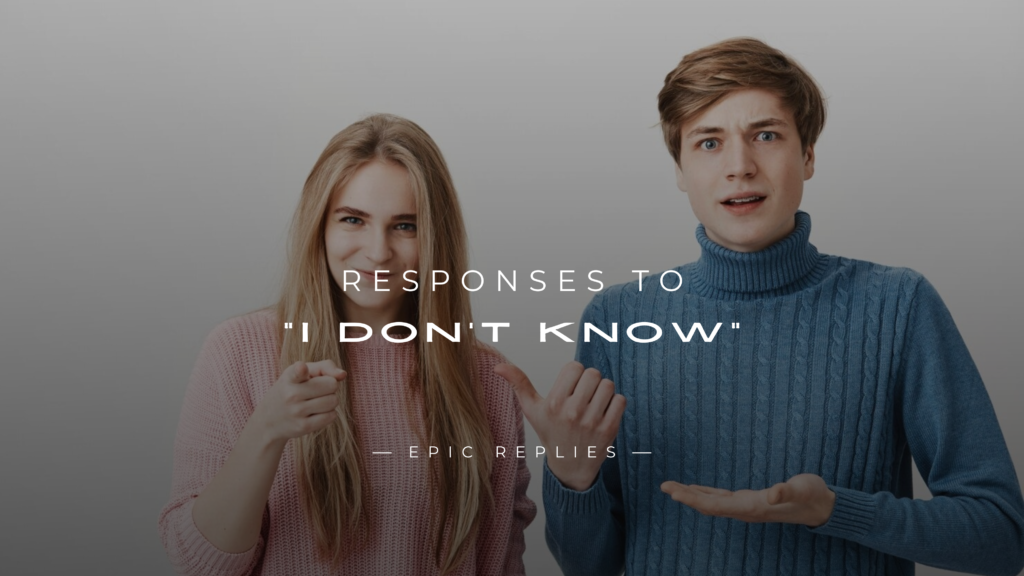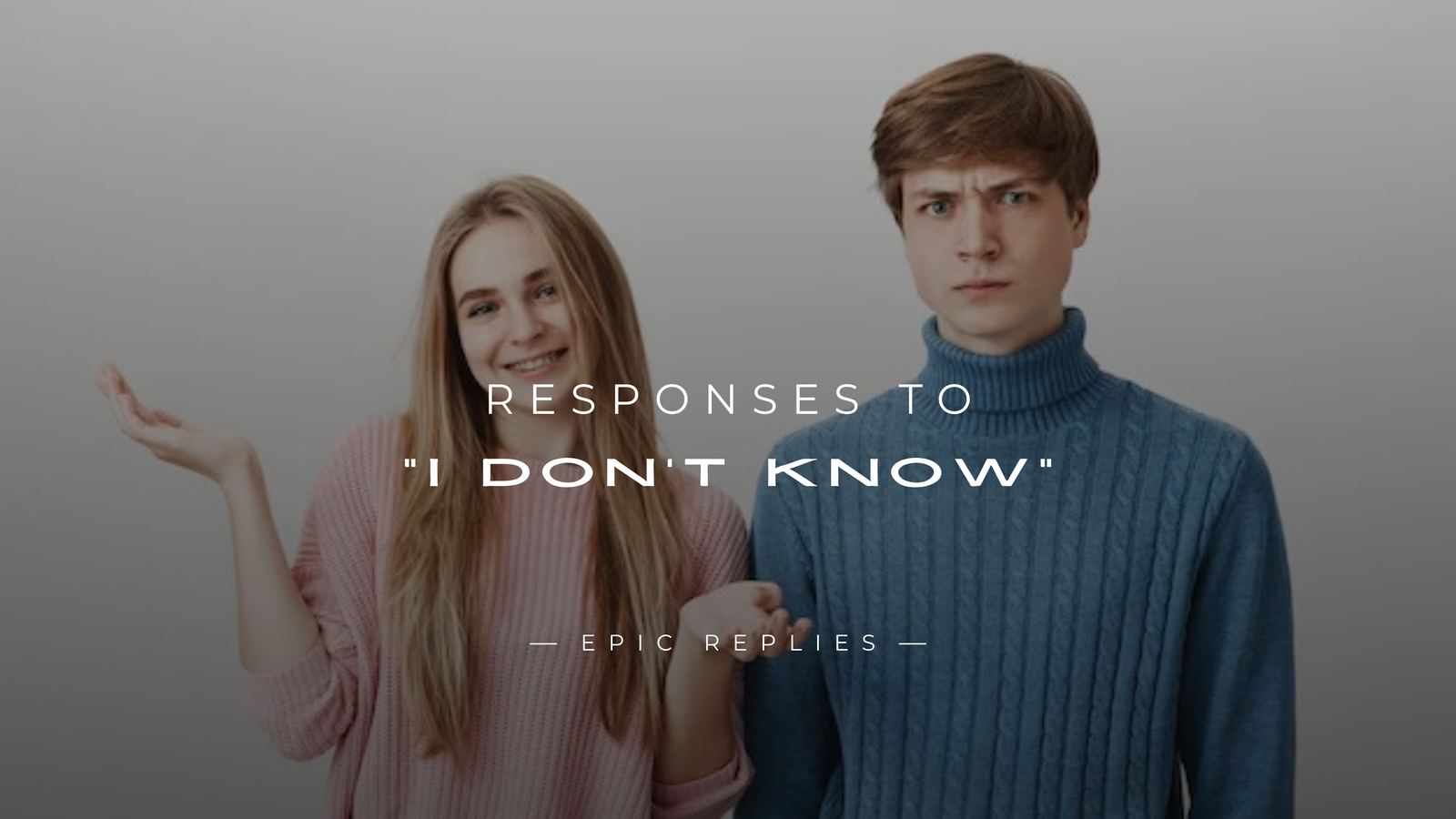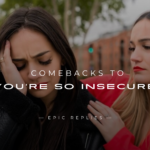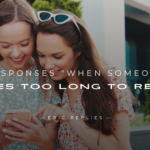We all know that awkward pause when someone looks at you and says, “I don’t know.” It can happen anywhere: during a work meeting, while talking with a partner, or in a simple everyday conversation. The phrase “I don’t know” might sound like the end of a discussion, but in truth, it can be the beginning of something meaningful. Understanding how to respond to “I don’t know” is not just about communication; it’s about connection, patience, and empathy. Whether you are a leader, parent, teacher, or friend, learning to handle those three little words can completely change the tone and outcome of your interactions. In this article, we will explore the psychology behind “I don’t know,” why people say it, and the most effective ways to respond so that conversations stay open, respectful, and productive.

250+ Responses to “I Don’t Know”
Request for Elaboration
- What part isn’t clear to you?
- Can you tell me more about what’s confusing?
- What do you think might be missing here?
- Is it the details or the big picture that’s unclear?
- What part are you unsure about?
- Can you walk me through your thought process so far?
- What’s making you hesitate to answer?
- What do you feel you’d need to know to be sure?
- Can you pinpoint what’s tripping you up?
- What makes you say you don’t know?
Encouraging Exploration
- That’s okay, take a guess!
- What’s your first instinct on it?
- If you had to choose, which way would you lean?
- What do you think could be the answer?
- Just give it a try, there’s no wrong attempt.
- What comes to mind first?
- Let’s explore what you do know and build from there.
- How would you start figuring it out?
- What options do you see right now?
- Let’s think it through together and see where it goes.
Context-Seeking
- What’s making you unsure about it?
- Have you come across this before?
- What’s your experience with this topic?
- When did you last think about something similar?
- What’s the situation that makes this hard to answer?
- What’s missing from the context that would help?
- Is there something that’s throwing you off?
- How familiar are you with this kind of thing?
- What background info might help make it clearer?
- What’s happening around this that adds to the confusion?
Prompt for Reflection
- If you had to make a guess, what would it be?
- What’s your gut telling you?
- How do you usually approach something like this?
- What patterns do you notice?
- What might you have said if you felt more confident?
- What could the reason behind it be?
- How would you explain it to someone else?
- What do you think you’re missing here?
- How would you go about finding the answer?
- What’s one thing you’re sure about in this situation?
Fact-Finding Follow-Up
- Who might have the answer?
- Where could we find more info on this?
- What resource would you check first?
- Have you looked this up before?
- Is there someone we could ask?
- Where did you last encounter something like this?
- What do you think would confirm the answer?
- What tool or source could help us verify it?
- Who’s the expert on this topic?
- What’s the best place to start researching this?
Confidence-Building
- It’s totally fine not to know right now.
- You’ll figure it out, I believe in you.
- Don’t worry, nobody gets it right away.
- You’re already thinking in the right direction.
- You’re capable of solving this, just give it a little time.
- You’ve handled tougher things before.
- It’s okay to pause and think; you’ve got this.
- Trust yourself, you know more than you think.
- You’re doing great by just trying to understand it.
- Every expert started by saying “I don’t know.”
Normalizing Uncertainty
- That’s a totally normal response.
- Honestly, not knowing is part of learning.
- Everyone hits that point sometimes.
- You’re not alone; this trips up a lot of people.
- It’s okay, nobody has all the answers.
- We all have moments like that.
- Admitting you don’t know is actually a good thing.
- That’s how discovery starts.
- You’re not supposed to know everything.
- That’s part of being curious, not clueless.
Curiosity Modeling
- Let’s find out together.
- That makes me curious too let’s dig into it.
- I wonder what we might learn if we check.
- Let’s treat that as a mystery to solve.
- Good question, let’s explore it.
- Now I’m curious too, want to find out?
- Let’s see what we can uncover.
- That’s an interesting unknown let’s chase it down.
- I like that we don’t know yet it means there’s more to learn.
- Let’s make that our next discovery.
Reassuring Response
- It’s fine, take your time.
- No pressure, you’ll get it.
- Don’t stress, we’ll figure it out together.
- That’s okay, you don’t have to know right away.
- You’re doing just fine.
- It’s all part of the process.
- There’s no rush, we can go step by step.
- It’s okay to pause and think for a bit.
- No worries at all, we’ll get there.
- You’re on the right track, even if you’re unsure.
Growth-Mindset Response
- That’s a great place to start learning something new.
- Not knowing just means you’re about to grow.
- You can figure it out with a bit of effort.
- Every expert was once in your position.
- Mistakes and confusion are part of getting better.
- This is how learning really happens.
- You’ll know it soon if you stay curious.
- Think of this as a chance to learn something valuable.
- It’s okay not to know yet, the “yet” part is what matters.
- You’re already improving just by asking the question.
Suggesting Resources
- Let’s look it up online together.
- Maybe check a quick tutorial on that.
- There’s probably a guide or article that explains it.
- You could ask someone who’s experienced with this.
- Want me to recommend a good resource?
- Let’s search for a video that breaks it down.
- There’s a book that covers this topic well.
- Try reading a few examples and see what fits.
- How about we look at the official documentation?
- Let’s find a simple explanation to start with.
Collaborative Approach
- Let’s figure it out together.
- We can brainstorm and see what comes up.
- How about we solve it step by step?
- I’ll help you work through it.
- Let’s combine what we both know.
- We can test a few ideas and learn from them.
- Want to team up and see what we find?
- Let’s share thoughts and compare notes.
- I’ll check one angle, you check another.
- We’ll get to the answer together.
Redirecting Focus
- What do you know about it so far?
- Let’s start with what’s clear to you.
- What part of it makes sense already?
- Tell me what you’re sure about first.
- Maybe focus on what’s working instead.
- Let’s look at the part you understand best.
- What’s one thing you’re confident about here?
- Let’s shift attention to what’s already known.
- What clues do you already have?
- Let’s build from what you already understand.
Option Offering
- Do you want a hint or would you like to think it through first?
- Would you like an example to help?
- I can explain it or guide you what works better for you?
- Want me to show you or do you want to try first?
- Would it help if I gave you some choices?
- Do you prefer a quick answer or a deeper explanation?
- Would you like me to walk you through it?
- Should I give you a clue to start?
- Would you rather guess or get some direction?
- Do you want a small push or a full answer?
Analytical Prompt
- What information would help you decide?
- How could we test which idea is right?
- What’s the logic behind your uncertainty?
- What evidence would make it clear to you?
- How can we break this into smaller questions?
- What assumptions might you be making here?
- How could you verify your guess?
- What patterns can you notice in the problem?
- What would change your mind one way or another?
- How could we measure or check this objectively?
Light Humor
- Same here, my brain just went on vacation.
- I don’t know either, but I’ll pretend I do.
- Let’s flip a coin and call it research.
- That’s the spirit confused but confident.
- Join the club of professional guessers.
- I love that answer, it’s 100 percent honest.
- Don’t worry, we’ll Google our way to glory.
- “I don’t know” is my favorite power phrase.
- At least you know that you don’t know that’s progress.
- Let’s file that under “mysteries of the universe.”
Empathetic Mirror
- I get that, it’s not an easy question.
- I understand, it can be confusing.
- I’ve been there before too.
- It’s okay, that’s a tough one for many people.
- I know that feeling, it’s frustrating sometimes.
- That makes sense, it’s a tricky topic.
- I hear you, that’s not obvious at first glance.
- Totally fair, I’d probably say the same.
- You’re not wrong for not knowing.
- I understand your hesitation it’s perfectly normal.
Encouraging Openness
- Thanks for being honest about that.
- I appreciate your transparency.
- It’s great that you can admit when you’re unsure.
- Sharing that you don’t know is really helpful.
- I like that you’re open about it.
- Being honest is the first step to figuring it out.
- That’s a good way to start a conversation.
- I respect that you’re upfront about it.
- It’s okay to say you don’t know, it keeps things real.
- Your honesty gives us a good place to begin.
Soft Redirection
- No worries, what do you think could be the first step?
- That’s okay, let’s focus on what you do know.
- Don’t stress, maybe start with what seems familiar.
- It’s fine, let’s try looking at it from another angle.
- That’s understandable, what’s your first instinct?
- It’s alright, let’s consider the parts you understand.
- Don’t worry, maybe we can approach it differently.
- That’s normal, let’s redirect to what’s clear.
- No problem, let’s take a closer look at the basics.
- It’s okay, let’s focus on the starting point.
Supportive Reframing
- Not knowing just means you’re learning something new.
- This is an opportunity to discover more.
- Every question you don’t know is a chance to grow.
- That’s part of the process, not a setback.
- You’re on the right track even if you don’t know yet.
- This moment is just a step toward understanding.
- Seeing what you don’t know helps you learn faster.
- That’s okay, it’s a signal to explore further.
- Every expert started with uncertainty.
- Your honesty is helping us approach this the right way.
Challenge Offering
- Want to take a wild guess?
- How about trying to reason it out?
- Can you come up with a possible solution?
- Think you can figure it out with a hint?
- Would you like to give it your best shot?
- Want to attempt it and see what happens?
- How about we turn this into a mini challenge?
- Ready to explore a possible answer together?
- Want to test your intuition on this?
- Could you try to solve it step by step?
Encouraging Ownership
- You can take the lead in figuring this out.
- This is a great chance for you to explore.
- Want to see if you can come up with a solution?
- You’re in charge of how we approach this.
- Take your time and see what you discover.
- You decide the first step forward.
- You can guide us through your thought process.
- This is your chance to experiment and learn.
- You own this question, so start where you feel confident.
- Let’s see what you come up with first.
Empowering Prompt
- Trust yourself, you know more than you think.
- You’re capable of figuring this out.
- Take a moment and trust your instincts.
- You have the skills to make sense of this.
- Believe in your ability to find the answer.
- You’ve solved tough problems before, you can do this.
- Think back to how you’ve handled similar situations.
- You can break this down and tackle it step by step.
- You’ve got this, just start with what you know.
- Your experience gives you a good starting point.
Next-Step Suggestion
- Let’s research this and see what we find.
- How about we make a plan to figure it out?
- Next, we could try looking at some examples.
- Let’s take a small step toward finding the answer.
- How about checking a resource to start?
- Let’s list what we know and what we need to find out.
- The next step could be testing an idea.
- Let’s break it into smaller pieces and tackle one.
- How about we ask someone knowledgeable next?
- Let’s decide on a first action and go from there.
Learning-Oriented Closure
- That’s a good question to explore next.
- Let’s see what we can learn from this.
- Not knowing gives us an opportunity to grow.
- We’ll figure it out and learn along the way.
- This is a perfect moment to expand our understanding.
- Let’s use this as a chance to improve.
- The next step is all about discovery.
- Learning comes from moments like this.
- We’ll take this as a learning opportunity.
- Every unknown is a doorway to new knowledge.
What Does “I Don’t Know” Really Mean?
At face value, “I don’t know” seems simple. But the truth is, it carries multiple layers of meaning depending on context, tone, and emotion. To respond effectively, you must first understand what the phrase actually communicates.
- When It’s Honest Uncertainty
Sometimes “I don’t know” is a sincere response. The person truly doesn’t have the information or hasn’t considered the question before. In these situations, the best approach is patience. The person is being honest rather than pretending to know something they don’t, which is actually a good sign of trust and integrity.
- When It’s a Defense Mechanism
There are times when “I don’t know” is not about lacking knowledge but about self-protection. People often use it when they feel uncomfortable, nervous, or afraid of being judged. They use the phrase as emotional armor to avoid embarrassment. Recognizing this can help you respond gently instead of with frustration.
- When It’s Avoidance or Disengagement
Not all uses of “I don’t know” are innocent. Sometimes it’s a way to escape a topic or avoid responsibility. In those cases, the key is not to push harder but to reframe the conversation in a way that re-engages the person’s interest.
- When It’s an Emotional Signal
Tone and body language reveal a lot. A hesitant, quiet “I don’t know” might mean the person is uncertain or anxious. A quick, dismissive one could mean irritation or emotional withdrawal. Paying attention to non-verbal cues helps you respond with emotional intelligence.
Why Do People Say “I Don’t Know”?
Understanding the reason behind “I don’t know” makes your response far more effective. People use the phrase for several reasons, and each one requires a different kind of response.
- Fear of Being Wrong
Many people are afraid of making mistakes, especially in professional or judgment-heavy settings. To avoid embarrassment, they say “I don’t know” instead of risking a wrong answer.
- Lack of Confidence
When someone lacks confidence in their ideas, “I don’t know” feels safer than expressing an opinion that might be challenged. In these moments, your job is to reassure and validate them.
- Needing More Time to Think
Sometimes people use “I don’t know” as a pause. It gives them time to gather their thoughts. It’s not a refusal to answer, just a signal that they need space. Give them a moment of silence, and you may be surprised how quickly they start sharing.
- Disinterest or Emotional Distance
In certain cases, “I don’t know” shows emotional disconnection. Maybe the person is tired, distracted, or simply not invested in the topic. Recognizing this helps you shift your approach or adjust the tone of the conversation.
The Psychology Behind “I Don’t Know”
The phrase “I don’t know” might sound simple, but psychologically, it can reveal a lot about how someone thinks and feels.
- Cognitive Overload
When people are faced with too much information, their brains can shut down temporarily. Saying “I don’t know” is their way of managing mental overload. It gives them a moment to reset.
- Emotional Self-Protection
When someone feels insecure or unsafe emotionally, “I don’t know” is a shield. It keeps them from feeling vulnerable or exposed. Responding with empathy can help them lower that defense.
- Social Conditioning
From a young age, many people are taught that not knowing something is bad. This conditioning creates anxiety when faced with questions they can’t answer. A kind response helps them feel safe to admit uncertainty.
How to Respond Effectively to “I Don’t Know”
Now that you understand the hidden meanings behind “I don’t know,” it’s time to learn how to respond in a way that encourages openness and communication.
- Stay Calm and Patient
Your reaction sets the tone. If you respond with frustration or impatience, the other person may shut down completely. A calm and curious attitude helps them feel comfortable continuing the conversation.
- Show Empathy
Use empathy to show understanding. A response like, “That’s okay, take your time” helps the person feel heard. When people feel accepted, they are more likely to open up.
- Ask Open-Ended Questions
Instead of “Why don’t you know?” ask “What do you think could be the reason?” or “What comes to mind when you think about it?” These types of questions invite thinking instead of defensiveness.
- Give Space to Reflect
Sometimes silence is powerful. If you pause after they say “I don’t know,” they may feel encouraged to elaborate once they realize you are not rushing them.
- Rephrase or Simplify the Question
If the question feels overwhelming, reframe it. Instead of “Why did this project fail?” ask “What parts of the project were most challenging?” Smaller, simpler questions are easier to answer.
Smart Strategies to Encourage Better Responses
You can use several conversation techniques to gently move people beyond “I don’t know.”
- Use Prompts Instead of Direct Questions
Prompts like “Tell me more about that” or “What are you thinking?” are less intimidating than direct questions. They feel like invitations, not interrogations.
- Offer Examples to Spark Ideas
When people are unsure, examples can help them organize their thoughts. You might say, “For instance, do you think it’s more about lack of time or resources?”
- Build Trust with Active Listening
Make it clear that you are listening. Nod, maintain eye contact, and repeat key words they say. This shows you care about their perspective.
- Normalize Not Knowing
Saying “That’s fair, none of us know everything” helps remove the stigma of uncertainty. It builds psychological safety, which encourages honesty.
How to Respond to “I Don’t Know” in Different Situations
- In Relationships
When a partner says “I don’t know,” it can mean confusion about feelings or fear of saying the wrong thing. Respond with care. Try saying, “That’s okay, take your time. I’m here when you’re ready.”
- At Work or in Business
In a professional environment, “I don’t know” can indicate a need for guidance or more information. Respond constructively: “That’s alright. Let’s figure it out together.” This fosters teamwork and problem-solving.
- In Teaching or Mentoring
Students and mentees often say “I don’t know” out of fear. Encourage exploration with a question like, “If you had to take a guess, what would it be?” It promotes critical thinking.
- In Interviews or Negotiations
If a candidate says “I don’t know,” you can assess how they handle uncertainty by asking, “How would you go about finding that answer?” It shows how they think under pressure.
What to Avoid When Someone Says “I Don’t Know”
Avoiding certain behaviors is just as important as knowing the right responses.
- Do Not Mock or Ridicule
Making jokes or sarcastic remarks about “I don’t know” damages trust and shuts down communication immediately.
- Do Not Push Aggressively
Pushing too hard can make people defensive. Respect their pace.
- Do Not Assume Laziness
Sometimes “I don’t know” is not about laziness but confusion or insecurity. Always look deeper before judging.
How to Turn “I Don’t Know” Into an Opportunity
- Encourage Exploration
Instead of seeing “I don’t know” as an obstacle, see it as an opening. Respond with, “Let’s explore it together.” This builds cooperation and curiosity.
- Use It as a Teaching Moment
Every time someone says “I don’t know,” you have a chance to help them learn something new. Guide them gently toward discovery.
- Promote a Culture of Openness
In both personal and professional environments, normalizing uncertainty creates a culture of honesty and innovation.
How to Use “I Don’t Know” Positively Yourself
Even you can use “I don’t know” in a powerful way.
- Admit Uncertainty Confidently
Saying “I don’t know” when you truly don’t is a sign of integrity. It’s far better than guessing or pretending.
- Follow Up with Curiosity
Don’t stop at “I don’t know.” Follow it with “But I’ll find out.” This shows initiative and a growth mindset.
- As a Leader or Role Model
When leaders say “I don’t know,” it gives others permission to be honest too. It encourages a learning culture instead of a perfectionist one.
Examples of Great Responses to “I Don’t Know”
- Personal Example:
Friend: “I don’t know what to do next.”
You: “That’s alright, what options have you been considering?” - Professional Example:
Coworker: “I don’t know how to handle this issue.”
You: “No problem, let’s go through it step by step.” - Educational Example:
Student: “I don’t know the answer.”
Teacher: “That’s okay, what do you think it could be?”
Key Takeaways
“I don’t know” is not always negative; it can signal honesty or reflection. Responding with empathy and patience builds stronger communication. Asking open-ended questions encourages deeper thinking. Reframing uncertainty as an opportunity leads to learning and growth. Using “I don’t know” positively promotes authenticity and trust.
Conclusion
Navigating conversations where someone says “I don’t know” doesn’t have to be awkward or frustrating. With over 250 responses listed in this guide, you now have practical, witty, and confident ways to keep discussions engaging and productive whether in casual chats, dating, or professional settings. Remember, the right response can turn uncertainty into an opportunity for connection or humor. For more tips on handling tricky texting situations, check out our guide on 250+ Responses “When Someone Takes Too Long To Reply”.
FAQs
Q. How can I make someone open up after they say “I Don’t Know”?
Give them time and ask gentle follow-up questions like “What makes you feel that way?” or “What ideas come to mind?”
Q. Is it okay to say “I Don’t Know” at work?
Yes. It shows honesty and professionalism. Just make sure to add, “But I’ll find out and get back to you.”
Q. What if someone always says “I Don’t Know”?
It could indicate fear or low confidence. Build trust by creating a safe environment for open discussion.
Q. How can parents or teachers help children move beyond “I Don’t Know”?
Encourage curiosity by asking questions like “What do you think might happen if we tried this?” to help them think critically.
Q. Can “I Don’t Know” be a positive phrase?
Absolutely. It shows humility and the willingness to learn. Growth often begins with admitting “I don’t know.”










